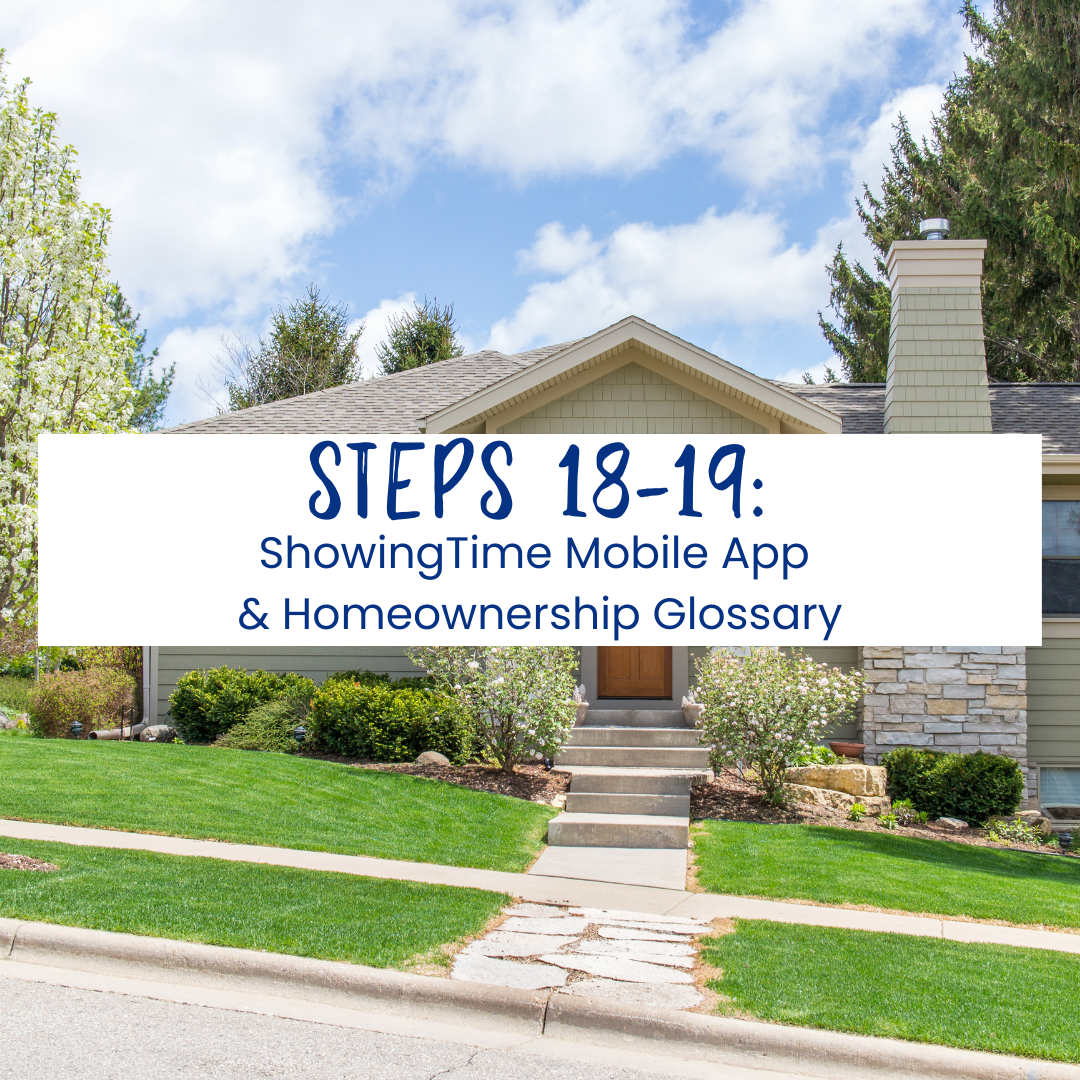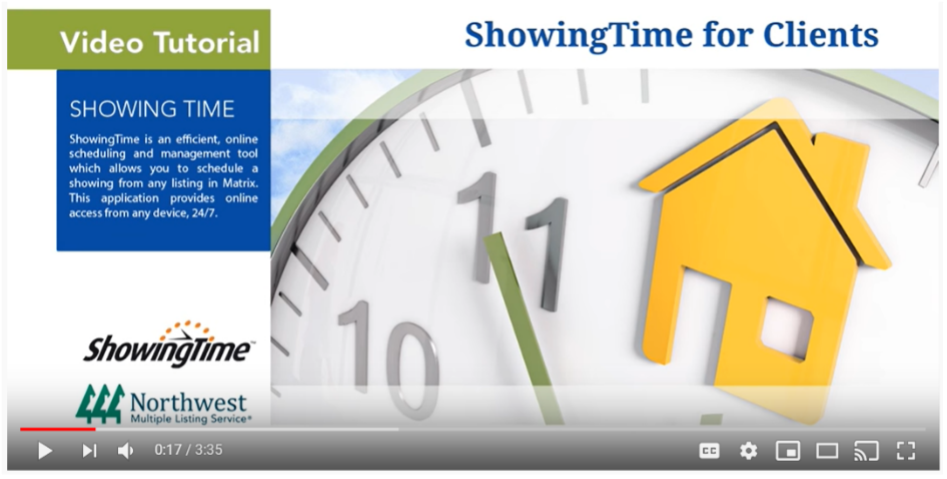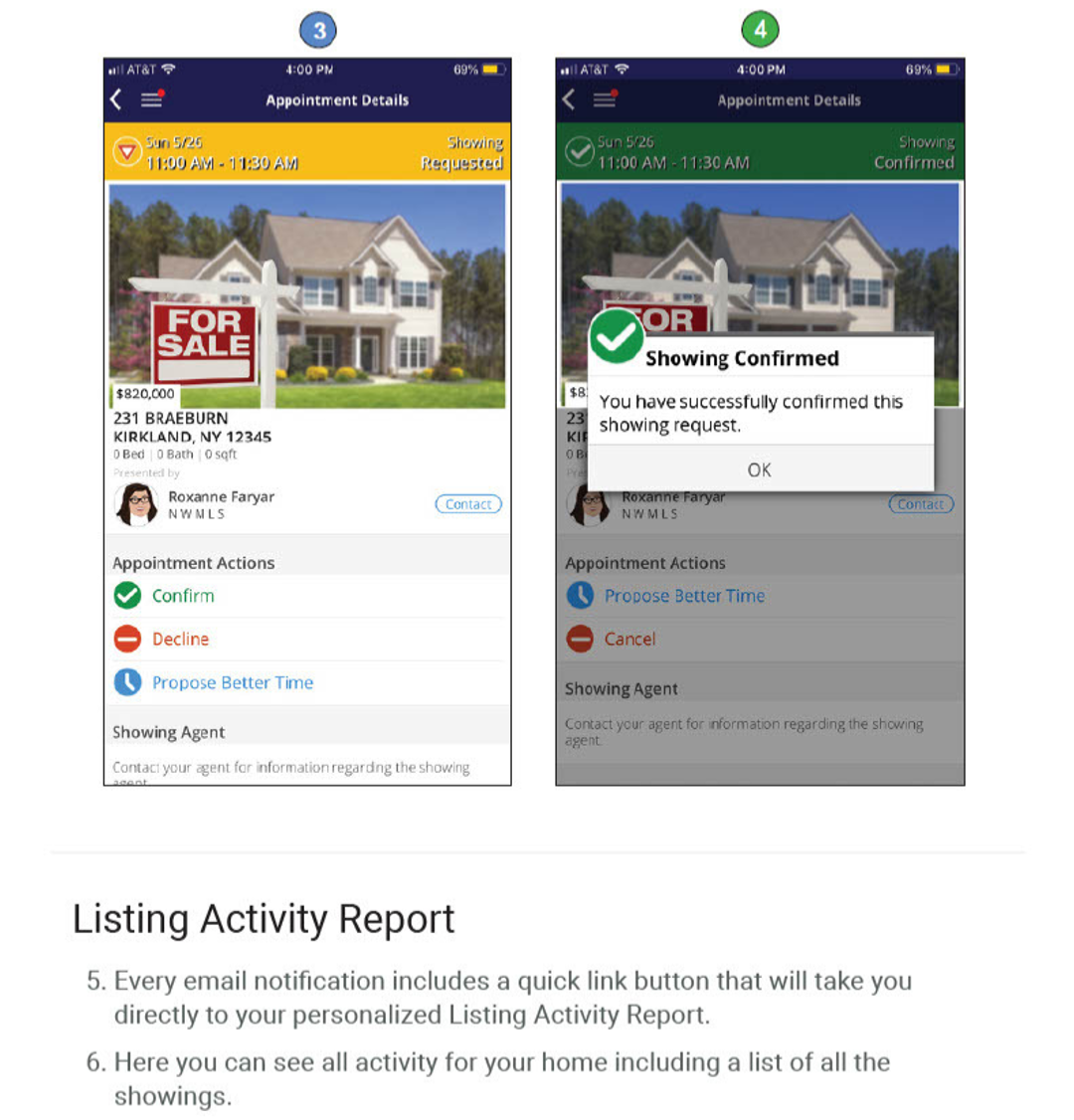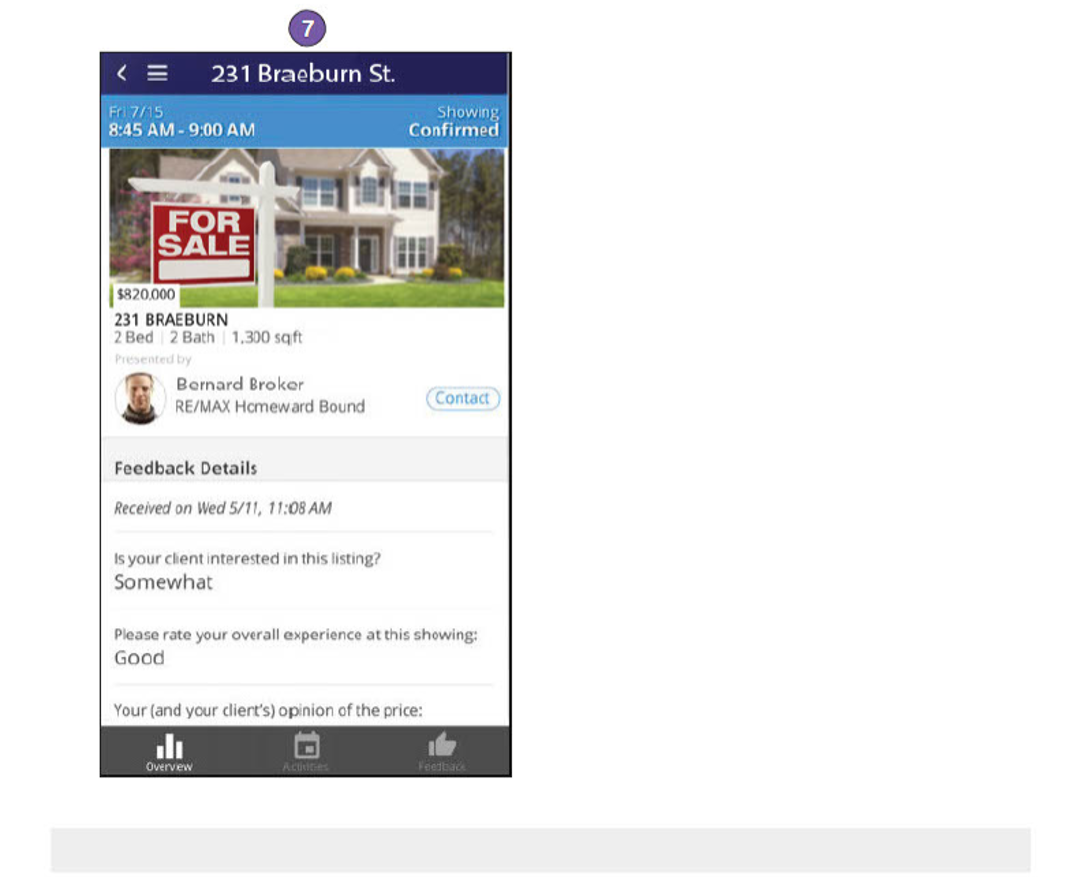Selling Steps 18-19: ShowingTime Mobile App & Homeownership Glossary

STEP 18
Have us send you the ShowingTime App.
The ShowingTime mobile app makes it easy for Sellers (you) to manage and take part in the home-selling process. By keeping up to date with your home’s showing activity, Sellers can:
- Confirm/decline showing requests
- See all upcoming appointments
- Review their home’s showing and feedback activity
- Easily contact your agent
- Adjust your notification preferences
Lorri Briggs, who’s sold five houses in four states, said using the ShowingTime mobile app helped her take the inefficiencies out of the home-selling process.
“I fell in love with ShowingTime immediately,” Lorri said. “I was amazed at how user-friendly the app was. It had everything I needed to know in one handy place … past showings, future showings, how many showings last week, and how many in the last 30 days. It was so awesome.
“Not only did it help me keep organized and on top of prospective Buyer traffic, but it clearly showed anything that I still needed to respond to. Every morning I would review our showing times and plan accordingly.”
Lorri’s not alone.
Many of our customers continuously comment on how much their homeowners enjoy having access to their listing’s information via the app:
“The feedback is an excellent way to communicate with Sellers!” — Ofe Polack, Coldwell Banker Residential Brokerage
“This makes the homeowner very happy.” — Gail Smith, Brokers Guild
“As a direct result of using ShowingTime, I have been able to service my clients right away and maintain showings and feedback in one place.” — Tommy Burdett, RE/MAX Coast and Country
Click here to see the video tutorial.








Q: CAN SELLERS CONFIRM APPOINTMENTS THROUGH THE APP?
A: Yes, if the listing agent has configured them on the listing worksheet to confirm appointments.
Q: CAN SELLERS SEE ALL FEEDBACK RESPONSES?
A: Only when the listing agent publishes the feedback to them. You can hide feedback responses by not publishing them; you also have the option to auto-publish feedback.
Q: CAN MY SELLERS SEE THE NAME AND CONTACT DETAILS OF THE BUYER’S AGENT?
A: The listing office can enable or disable this option for Sellers. If enabled, only the showing agent’s name and/or office will appear with the appointment details. ShowingTime never shares showing agent contact details with Sellers, such as a phone number or email address.
Q: DO SELLERS NEED A SPECIAL LOGIN TO ACCESS THE APP?
A: No. Once the listing agent has enabled the Seller (this can be done from the listing worksheet), the Seller will receive an email inviting them to download the app. They can then follow the authentication process to use the app.
Q: WHY DO SELLERS NEED THE SHOWINGTIME MOBILE APP?
A: In a 2018 study*, the National Association of REALTORS® reported that nearly 60 percent of Sellers were under the age of 50, with most in that age group being tech-savvy consumers. In a time when information is instantly accessible, people expect to perform everyday tasks from their mobile devices. The ShowingTime mobile app gives Sellers quick access to upcoming showings, past showing details, their listing agent’s contact information, and more.
STEP 19
AGENCY —
A relationship created when one person, the "principal," delegates to another, the "Agent," the right to act on the principal's behalf in business transactions and to exercise some degree of discretion while so acting. An agency gives rise to a fiduciary relationship and imposes on the Agent, as the fiduciary of the principal, certain duties, obligations, and high standards of good faith and loyalty.
AGENT —
One who is authorized to represent and to act on behalf of another person (called the principal). A real estate broker is the Agent of his client, be it the Seller or Buyer, to whom he owes a fiduciary obligation. A salesman is the Agent of his broker and does not have a direct personal contractual relationship with either the Seller or Buyer.
AGREEMENT OF SALE —
An agreement between the Seller (vendor) and Buyer (vendee) for the purchase of real property.
APPRAISAL —
The process of estimating, fixing, or setting the market value of real property. An appraisal may take the form of a lengthy report, a completed form, a simple letter, or even an oral report.
APPRECIATION —
An increase in the worth or value of property due to economic or related causes, which may prove to be either temporary or permanent.
ASSESSED VALUATION —
The value of real property as established by the state government for purposes of computing real property taxes.
ASSESSMENT —
A specific levy for a definite purpose, such as adding curbs or sewers in a neighborhood. Individual condominium owners are subject to special assessments benefiting the project as a whole and not funded through regular maintenance charges.
ASSIGNMENT —
The transfer of the right, title, and interest in the property of one person, the assignor, to another, the assignee. In real estate, there are assignments of mortgages, contracts, agreements of sale, leases, and options, among others.
BREACH OF CONTRACT —
Violation of any of the terms or conditions of a contract without legal excuse; default, non-performance, such as failure to make payment when due.
BROKER —
One who acts as an intermediary between parties to a transaction. A real estate broker is a properly licensed person who, for a valuable consideration, serves as an Agent to others to facilitate the sale or lease of real property.
BROKERAGE —
That aspect of the real estate business which is concerned with bringing together the parties and completing a real estate transaction. Brokerage involves exchanges, rentals, trade-ins, and management of property, as well as sales.
BUILDING PERMIT —
A written permission granted by the County Building Department and required prior to beginning the construction of a new building or other improvement (including fences, fence walls, retaining walls, and swimming pools).
CAPITAL GAIN —
The taxable profit derived from the sale of a capital asset.
CAPITAL IMPROVEMENT —
Any structure that’s erected as a permanent improvement to real property; any improvement that’s made to extend the useful life of a property, or to add to the value of the property.
CLEAR TITLE —
Title to property that’s free from liens, defects, or other encumbrances, except those which the Buyer has agreed to accept, such as mortgage to be assumed, the ground lease of record, and the like; established title; title without clouds.
CLOSING —
The final stage of consummating a real estate transaction when the Seller delivers the title to the Buyer, in exchange for the purchase price.
CLOSING COSTS —
Expenses of the sale which must be paid in addition to the purchase price (in the case of the Buyer's expenses) or be deducted from the proceeds of the sale (in the case of the Seller's expenses).
CLOSING STATEMENT —
A detailed cash accounting of a real estate transaction prepared by an escrow officer or other person designated to process the mechanics of the sale, showing all cash that was received, all charges and credits which were made, and all cash that was paid out in the transaction; also called a settlement statement.
CLOUD ON TITLE —
Any document, claim, unreleased lien, or encumbrance which may impair or injure the title to property or make the title doubtful because of its apparent or possible validity.
CODE OF ETHICS —
A written system of standards of ethical conduct. The Code of Ethics of the NATIONAL ASSOCIATION OF REALTORS®, first written in 1913, establishes the high standards of conduct for members of the REALTOR® community.
COMMISSION —
The compensation paid to a Real Estate Broker (usually by the Seller) for services rendered in connection with the sale or exchange of real property.
COMMITMENT —
A pledge or promise to do a certain act, such as the promise of a lending institution to loan a certain amount of money at a fixed rate of interest to a qualified Buyer, provided the loan is obtained on or before a certain date.
COMPARABLES —
Recently sold properties, which are similar to a particular property being evaluated, and which are used to indicate a reasonable fair market value for the subject property.
CONTINGENCY —
A provision placed in a contract that requires the completion of a certain act or the happening of a particular event before a contract is binding.
CONTRACT —
A legal agreement between competent parties who agree to perform or refrain from performing certain acts for a consideration. In real estate, there are many different types of contracts, including listings, contracts of sale, purchase & sale agreements, options, mortgages, assignments, leases, deeds, escrow agreements, and loan commitments, among others.
CONVENTIONAL LOAN —
A type of mortgage loan made by a bank or other financial institution on its own terms, not underwritten by a government-insured program such as FHA or VA. Conventional loans can be both conforming--written to the underwriting standards set by Fannie Mae and Freddie Mac--or non-conforming.
CONVEYANCE —
The transfer of title to real property by means of a written instrument, such as a deed or an assignment of lease.
COUNTEROFFER —
A new offer made as a reply to an offer received from another; this has the effect of rejecting the original offer, which cannot thereafter be accepted unless revived by the offeror's repeating it.
COVENANTS AND CONDITIONS —
Covenants are promises contained in contracts, the breach of which would entitle a person to damages. Conditions, on the other hand, are contingencies, qualifications, or occurrences upon which an estate or property right would be gained or lost.
COVENANTS RUNNING WITH THE LAND —
Covenants that become part of the property and benefit or bind successive owners of the property.
DECLARATION OF RESTRICTIONS —
A statement of all the covenants, conditions, and restrictions ("CC&Rs") that affect a parcel of land.
DEED —
A written instrument by which a property owner "grantor" transfers to a "grantee" an ownership in real property.
DEED OF TRUST —
A legal document in which title to property is transferred to a third-party trustee as security for an obligation owed by the trustor (borrower) to the beneficiary (Lender).
DEFAULT —
Failure to fulfill a duty or promise or failure to perform any obligation or required act. The most common occurrence of default on the part of a Buyer or lessee is non-payment of money.
DENSITY —
A term, frequently used in connection with zoning requirements, which means the maximum number of building units per acre or the number of occupants or families per unit of land area (acre, square mile, etc.); usually the ratio of land area to improvement area.
DEPOSIT —
Money offered by a prospective Buyer as an indication of good faith in entering into a contract to purchase; earnest money; security for the Buyer's performance of a contract.
DUAL AGENCY —
Representing both principals (Buyer and Seller) in a transaction.
EASEMENT —
A property interest which one person has in land owned by another entitling the holder of the interest to limited use or enjoyment of the other's land.
EASEMENT IN GROSS —
The limited right of one person to use another's land (servient estate), which right isn’t created for the benefit of any land owned by the owner of the easement; that is, there’s no dominant estate, as the easement attaches personally to the owner, not to the land.
ENCUMBRANCE —
Any claim, lien, charge, or liability attached to and binding upon real property which may lessen the value of the property but won’t necessarily prevent the transfer of title.
ENERGY STAR —
A voluntary labeling program created by the U.S. Environmental Protection Agency (EPA) designed to identify and promote energy-efficient products, including major appliances, office equipment, lighting, home electronics, and more.
ENGINEERED WOOD FLOORS —
Flooring material composed of a thin veneer layer of solid wood that is laminated to a plywood backing, allowing the planks to withstand temperature and moisture fluctuations without warping like solid wood.
ENTIRETY, TENANCY BY —
A form of joint ownership of property between husband and wife with the right of survivorship.
ENVIRONMENTAL IMPACT STATEMENT —
A report which includes a detailed description of a proposed development project with emphasis on the existing environment setting, viewed from both a local and regional perspective, and a discussion of the probable impact of the project on the environment during all phases.
EQUITY —
That interest or value remaining in the property after payment of all liens or other charges on the property. An owner's equity is normally the monetary interest over and above the mortgage indebtedness.
ESCHEAT —
The reversion of property to the state when a decedent dies intestate and there are no heirs capable of inheriting, or when the property is abandoned.
ESCROW —
The process by which money and/or documents are held by a disinterested third person (a "stakeholder") until the satisfaction of the terms and conditions of the escrow instructions (as prepared by the parties to the escrow).
EXCHANGE —
A transaction in which all or part of the consideration for the purchase of real property is the transfer of property of a like kind.
EXCLUSIVE LISTING —
A written listing of real property in which the Seller agrees to appoint only one Broker to sell the property for a specified period of time. The two types of exclusive listings are the exclusive agency and the exclusive right to sell.
EXECUTOR —
A person appointed by a testator to carry out the directions and requests in the last will and testament, and to dispose of property according to the provisions of the will.
EXTENSION —
An agreement to continue the period of performance beyond the specified period.
FAIR MARKET VALUE —
The highest monetary price which a property would bring, if offered for sale for a reasonable period of time in a competitive market, to a Seller who is willing but not compelled to sell, from a Buyer, willing but not compelled to buy, both parties being fully informed of all the purposes to which the property is best adapted and is capable of being used.
FANNIE MAE —
The Federal National Mortgage Association is a government-chartered corporation whose mission is to purchase and securitize mortgages in order to ensure that funds are consistently available to the institutions that lend money to homebuyers.
FEASIBILITY STUDIES —
An investigation carried out by architects, engineers, or other specialists to determine if an improvement or addition is necessary, cost-effective, or desirable.
FEASIBILITY STUDY —
An analysis of a proposed project with emphasis on the attainable income, probable expenses, and most advantageous use and design.
FEDERAL HOUSING ADMINISTRATION (FHA) —
The FHA was set up in 1934 under the National Housing Act to encourage improvement in housing standards and conditions, to provide an adequate home financing system by insurance of housing mortgages and credit, and to exert a stabilizing influence on the mortgage market.
FEDERAL TAX LIEN —
A federal lien that attaches to real property, either if the federal estate tax is not paid, or if the taxpayer has violated the federal income tax or payroll tax laws.
FEE SIMPLE —
The largest estate one can possess in real property. A fee simple estate is the least limited interest and the most complete and absolute ownership in land: It is of indefinite duration, freely transferable, and inheritable. Fee simple title is sometimes referred to as "the fee.”
FIDUCIARY —
A relationship that implies a position of trust or confidence wherein one is usually entrusted to hold or manage property or money for another. Among the obligations a fiduciary owes to the principal are duties of loyalty; obedience; full disclosure; the duty to use skill, care, and diligence; and the duty to account for all monies.
FINANCE FEE —
A mortgage brokerage fee to cover the expenses incurred in placing the mortgage with a lending institution; a mortgage service charge or origination fee.
FINANCIAL STATEMENT —
A formal statement of the financial status and net worth of a person or company, setting forth and classifying assets and liabilities as of a specified date.
FIRST REFUSAL, RIGHT OF —
The right of a person to have the first opportunity either to purchase or lease real property.
FIXTURE —
An article that was once personal property but has been so affixed to the real estate that it has become real property (e.g. stoves, bookcases, plumbing, etc.). If determined to be a fixture, then the article passes with the property even though it is not mentioned in the deed.
FORECLOSURE —
The process whereby a Lender, such as a bank, seeks to repossess a property where the owner has failed to comply with the terms of the mortgage or promissory note, such as not making a payment. Once the property has been foreclosed, the bank can then sell the house, using the money to pay its costs.
FREDDIE MAC —
The Federal Home Loan Mortgage Corporation, a government-sponsored enterprise (GSE) that purchases home mortgages in the secondary market, repackages them into securities, and sells them to investors, thereby increasing the amount of money available for new home loans at banks and thrifts. Freddie Mac was created in 1970 partly in response to the privatization of Fannie Mae as competition. Both entities have essentially the same mission. The difference between Freddie Mac and Fannie Mae is that Fannie Mae primarily buys mortgages issued by banks and Freddie Mac primarily buys mortgages issued by thrifts.
FREE AND CLEAR TITLE —
Title to real property which is absolute and unencumbered by any liens, mortgages, clouds, or other encumbrances.
FRENCH DRAIN —
A slightly sloped trench filled with round gravel and perforated pipe that is used to divert underground water away from a house or building. Named for Henry French, a judge, and farmer in Concord, Massachusetts, who promoted the idea in an 1859 book about farm drainage.
FRONTAGE —
The length of a property abutting a street or body of water; that is, the number of feet that "front" the street or water.
GRANTEE —
The person who receives from the grantor a grant of real property.
GRANTOR —
The person transferring title to, or an interest in, real property. A grantor must be competent to convey; thus, for example, an insane person can’t convey title to real property.
GROSS AREA —
The total floor area of a building measured from the exterior of the walls (excluding those unenclosed).
GROSS INCOME MULTIPLIER —
A useful rule of thumb to estimate the market value of an income-producing residential property. The multiplier is derived by using comparable sales divided by the actual or estimated monthly rentals and arriving at an acceptable average.
GROUND-FAULT CIRCUIT INTERRUPTER (GFCI) —
A device designed to prevent severe or fatal electric shocks by monitoring the flow of electric current through wiring. If the device detects a drop or fault, it immediately shuts off the power. GFCIs are required by building codes for electrical outlets in bathrooms, kitchens, garages, and other areas.
HIGHEST AND BEST USE —
That use which, at the time of appraising the property, is most likely to produce the greatest net return to the land and/or the building over a given period of time.
HOME EQUITY LINE OF CREDIT (HELOC) —
A revolving line of credit where the Lender agrees to make available a certain amount of money for a certain time period secured by the value of the borrower’s home. The funds are not advanced upfront, but rather the borrower can choose when to use the money, much like a credit card. HELOCs are frequently used for major remodeling projects, to pay for college tuition or other large expenses. Generally, the interest rate in HELOCs is adjustable.
HOME EQUITY LOAN —
Also known as a second mortgage, a personal loan secured by the value of the borrower’s home. The money is transferred to the borrower upfront and interest begins to accrue immediately.
HOMEOWNER'S ASSOCIATION —
A non-profit association of homeowners organized pursuant to a declaration of restrictions or protective covenants for a subdivision, a PUD, or a condominium.
HOMEOWNERS INSURANCE —
Insurance coverage is designed to protect a home and its contents, as well as shield the owner from liability for accidents and such on the property.
HUD —
A federal cabinet department officially known as the U.S. Department of Housing and Urban Development.
HVAC —
Heating, Ventilation, and Air Conditioning--the climate control systems of a house or building.
IMPROVED LAND —
Real property whose value has been enhanced by the addition of on-site and off-site improvements, such as roads, sewers, utilities, buildings, etc.; as distinguished from raw land.
IMPROVEMENTS —
Valuable additions made to a property, amounting to more than repairs, costing labor and capital, and intended to enhance the value of the property. Improvements of land would include grading, sidewalks, sewers, streets, utilities, etc. Improvements on land would include buildings, fences, and the like.
INCOME APPROACH —
An approach to the valuation or appraisal of real property as determined by the amount of net income the property will produce over its remaining economic life.
INCOME PROPERTY —
Property purchased primarily for the income to be derived plus certain tax benefits, such as accelerated depreciation. Income property can be commercial, industrial, or residential.
INSPECTION —
A visit to and review of the premises. A prudent purchaser of property always inspects the premises before closing.
INTEREST —
The sum paid or accrued in return for the use of money.
INTERIM FINANCING —
A short-term loan usually made during the construction phase of a building project; often referred to as the "construction loan."
INTESTATE —
To die without a valid will.
JOINT TENANCY —
A form of property ownership by two or more persons in which the joint tenants have one and the same interest, arising by one and the same conveyance, commencing alone and at the same time and held by one and the same possession (the concept of "four unities").
JUDGMENT LIEN —
A lien binding on all the real estate of a judgment-debtor and giving the holder of the judgment a right to levy (i.e. to seize) the land for satisfaction of the judgment.
JUDICIAL FORECLOSURE —
A method of foreclosing upon real property by means of a court-supervised sale. After an appraisal, the court determines an upset price below which no bids to purchase will be accepted.
JUNIOR MORTGAGE —
A mortgage which is subordinate in right or lien priority to an existing mortgage on the same realty, such as a second mortgage.
JURISDICTION —
The authority or power to act, such as the authority of a court to hear and render a decision that binds both parties.
LEGAL DESCRIPTION —
A description that’s complete enough that an independent surveyor could locate and identify a specific piece of real property.
LEGAL NOTICE —
That notice that’s either implied or required by law. Constructive notice under the recording laws is also referred to as legal notice.
LETTER OF INTENT —
An expression of intent to invest, develop or purchase without creating any firm legal obligation to do so.
LICENSEE —
A person who has a valid license. A real estate licensee can be a salesperson or a Broker, active or inactive, an individual, a corporation, or a partnership.
LIEN —
A charge or claim which one person has upon the property of another as security for a debt or obligation. Liens can be created by agreement of the parties (mortgage) or by operation of law (tax liens).
LIMITED COMMON ELEMENTS —
That special class of common elements in a condominium reserved for the use of a certain apartment(s) to the exclusion of other apartments.
LINE OF CREDIT —
A maximum amount of money a bank will lend one of its more reliable and credit-worthy customers without the need for any formal loan submission.
LIQUIDATED DAMAGES —
An amount predetermined by the parties to an agreement as the total amount of compensation an injured party should receive in the event the other party breaches a specified part of the contract.
LISTING —
A written employment agreement between a property owner and a broker authorizing the broker to find a Buyer or a tenant for a certain real property.
LOAN-TO-VALUE RATIO —
The ratio that the amount of the loan bears to the appraised value of the property or the sales price, whichever is lower.
LOT LINE —
The boundary line separating a property from its neighbors.
MAINTENANCE —
The care and work put into a building to keep it in operation and productive use; the general repair and upkeep of a building. If maintenance is deferred, the building will suffer a loss in value.
MARKET VALUE —
The highest price, estimated in terms of money, which a property will bring if exposed for sale in the open market, allowing a reasonable time to find a purchaser who buys with knowledge of all the uses to which the property is adapted and for which it is capable of being used.
MARKETABLE TITLE —
Good or clear title reasonably free from risk of litigation over possible defects; also referred to as merchantable title. Marketable title need not, however, be perfect title.
MASTER PLAN —
A comprehensive plan to guide the long-term physical development of a particular area.
MISREPRESENTATION —
A false statement or concealment of a material fact made with the intent to induce some action by another party.
MONUMENTS —
Visible markers, both natural and artificial objects, which are used to establish the lines and boundaries of a survey.
MORTGAGE —
A legal document used to secure the performance of an obligation. In effect, the mortgage states that the Lender can look to the property in the event the borrower defaults in payment of the note.
MORTGAGE BANKER —
A corporation or firm that normally provides its own funds for mortgage financing.
MORTGAGE BROKER —
A person or firm that acts as an intermediary between borrower and Lender; one who, for compensation or gain, negotiates, sells, or arranges loans and sometimes continues to service the loans.
MORTGAGE INTEREST DEDUCTION —
Filing a person’s mortgage interest as a tax deduction, which can be done on Form 1040, Schedule A.
MORTGAGEE —
The one who receives and holds a mortgage as security for a debt; the Lender; a Lender or creditor who holds a mortgage as security for payment of an obligation.
MORTGAGOR —
The one who gives a mortgage as security for a debt; the borrower; usually the Multiple Listing Service (MLS) landowner; the borrower or debtor who hypothecates or puts up his property as security for an obligation.
MULTIPLE LISTING SERVICE (MLS) —
An organization created by REALTORS® to facilitate the sharing of listings among member brokers.
NATIONAL ASSOCIATION OF REALTORS® —
The largest and most prestigious real estate organization in the world, which seeks to be the leading advocate of the right to own, use, and transfer real property; the acknowledged leader in developing standards for efficient, effective, and ethical real estate business practices. Working on behalf of America's property owners, the NATIONAL ASSOCIATION OF REALTORS® provides a facility for professional development, research, and exchange of information among its members and to the public and government for the purpose of preserving the free enterprise system, and the right to own, use, and transfer real property.
NEGOTIATION —
The transaction of business aimed at reaching a meeting of minds among the parties; bargaining.
NFIP —
National Flood Insurance Program--A United States program, managed by FIMA (Federal Insurance and Mitigation Administration) to provide flood insurance to the American populace.
NONCONFORMING USE —
A permitted use that was lawfully established and maintained but which no longer conforms to the current use regulations because of a change in the zoning.
NORMAL WEAR AND TEAR —
That physical deterioration that occurs in the normal course of the use for which a property is intended, without negligence, carelessness, accident, or abuse of the premises (or equipment or chattels) by the occupant, members of a household, or their invitees or guests.
NOTE —
A document signed by the borrower of a loan, stating the loan amount, the interest rate, the time and method of repayment, and the obligation to repay. The note is the evidence of the debt. When secured by a mortgage, it’s called a mortgage note.
NOTICE —
1.) Legal notice is notice that’s required to be made by law, or notice that’s imparted by operation of law as a result of the possession of property or the recording of documents. 2.) Notice that’s required by contract, for example, when the parties agree to terminate a contract by the written notice of either party 30 days before termination.
NOTICE OF COMPLETION —
Document filed to give public notice that a construction job has been completed and that mechanics' liens must be filed within, say, 45 days to be valid.
NULL & VOID —
Having no legal force or effect; of no worth; unenforceable; not binding.
OFFER —
A promise by one party to act or perform in a specified manner provided the other party will act or perform in the manner requested.
OFFER AND ACCEPTANCE —
The two components of a valid contract; a "meeting of the minds."
OPERATING EXPENSES —
Those periodic and necessary expenses that are essential to the continuous operation and maintenance of a property.
OPINION OF TITLE —
An opinion by a person competent in examining titles, usually a title attorney, as to the status of the title of a property.
OPTION —
An agreement to keep open, over a set period, an offer to sell or purchase a property.
ORIGINATION FEE —
The finance fee charged by a Lender for placing a mortgage, which covers initial costs such as preparation of documents and credit, inspection, and appraisal fees.
PARCEL —
A specific portion of a larger tract; a lot.
PERCOLATION TEST —
A hydraulic engineer's test of soil to determine the ability of the ground to absorb and drain water.
PERSONAL PROPERTY —
Things that are tangible and moveable; property that’s not classified as real property; chattels.
PLANNED UNIT DEVELOPMENT (PUD) —
A modern concept in housing designed to produce a high density of dwellings and maximum use of open spaces.
PLAT —
A map of a town, section, or subdivision indicating the location and boundaries of individual properties.
POINTS —
A generic term for a percentage of the principal loan amount which the Lender charges for making the loan; each point is equal to 1% of the loan amount.
POSSESSION —
The act of either actually or constructively possessing or occupying property.
POWER OF ATTORNEY —
A written instrument authorizing a person (the attorney-in-fact) to act as the Agent on behalf of another.
PRE-SALE —
A pre-construction sale program by a condominium developer who’s required to sell a certain percentage of units before a Lender will commit to finance the construction of the project.
PRIVATE MORTGAGE INSURANCE —
A special form of insurance designed to permit Lenders to increase their loan-to-market-value ratio, often up to 95 percent of the market value of the property.
PROBATE —
The formal judicial proceeding to prove or confirm the validity of a will. The will is presented to the probate court, and creditors and interested parties are notified to present their claims or to show cause why the provisions of the will should not be enforced by the court.
PROCURING CAUSE —
That effort which brings about the desired result, as in producing the Buyer for the listed property.
PROMISSORY NOTE —
An unconditional written promise of one person to pay a certain sum of money to another, or order, or bearer, at a future specified time.
PROPERTY —
The rights or interests a person has in the thing owned; not, in the technical sense, the thing itself. These rights include the right to possess, to use, to encumber, to transfer, and to exclude, commonly called the "bundle of rights."
PUNCH LIST —
A discrepancy list showing defects in construction that need some corrective work to bring the building up to standards set by the plans and specifications.
QUITCLAIM DEED —
A deed of conveyance that operates, in effect, as a release of whatever interest the grantor has in the property; sometimes called a release deed.
R-VALUE —
In insulation, a measure of resistance to heat transfer. The bigger the number, the more effective the insulation material.
RADIANT HEAT —
The process of supplying heat through the floor or walls of a structure.
RAW LAND —
Unimproved land; land in its unused natural state before the construction of improvements such as streets, lighting, sewers, and the like.
REAL ESTATE —
The physical land and appurtenances, including any structures; for all practical purposes synonymous with real property.
REAL PROPERTY —
All land and appurtenances to land, including buildings, structures, fixtures, fences, and improvements erected upon or affixed to the same; excluding, however, growing crops.
REALTOR® —
A registered word which may only be used by an active real estate broker who is a member of the state and local real estate board affiliated with the NATIONAL ASSOCIATION OF REALTORS®. The use of the name REALTOR® in advertising is strictly governed by the rules and regulations of the National Association.
RECORDING —
The act of entering into the book of public records the written instruments affecting the title to real property, such as deeds, mortgages, contracts of sale, options, assignments, and the like. Proper recordation imparts constructive notice to all the world of the existence of the recorded document and its contents.
REFINANCE —
The act of obtaining a new loan to pay off an existing loan; the process of paying off one loan with the proceeds from another.
RESCISSION —
The legal remedy of canceling, terminating, or annulling a contract and restoring the parties to their original positions; a return to the status quo.
RESERVE FUND —
Monies set aside as a cushion of capital for future payment of items such as taxes, insurance, furniture replacement, deferred maintenance, etc.; sometimes referred to as an impound account.
RESTRICTIONS —
Limitations on the use of property. Private restrictions are created by means of restrictive covenants written into real property instruments, such as deeds and leases.
RESTRICTIVE COVENANT —
A private agreement, usually contained in a deed, which restricts the use and occupancy of real property.
REVERSE MORTGAGE —
A special type of home loan available to seniors that converts a portion of the equity in a home into cash. Unlike a traditional home equity loan or second mortgage, no repayment is required until the borrower(s) no longer use the home as their principal residence.
RIGHT-OF-WAY —
The right or privilege, acquired through accepted usage or by contract, to pass over a designated portion of the property of another.
RUNNING WITH THE LAND —
Rights or covenants that bind or benefit successive owners of a property are said to run with the land, such as restrictive building covenants in a recorded deed, which would affect all future owners of the property.
SALE AND LEASEBACK —
A transaction in which, typically, an owner sells his improved property and as part of the same transaction signs a long-term lease and remains in possession.
SEPTIC TANK —
A sewage settling tank in which part of the sewage is converted into gas and liquids before the remaining waste is discharged by gravity into a leaching bed underground.
SETBACK —
Zoning restrictions on the amount of land required surrounding improvements; the amount of space required between the lot line and the building line.
SETTLEMENT —
The act of adjusting and prorating the various credits, charges, and settlement costs to conclude a real estate transaction.
SHORT SALE —
In real estate, a sale of a property by a Lender where the sale price is less than what is owed on the mortgage.
SIMPLE INTEREST —
Interest computed on the principal balance only.
SPECIAL ASSESSMENT —
A tax or levy customarily imposed against only those specific parcels of realty that will benefit from a proposed public improvement, as opposed to a general tax on the entire community.
SPECIAL WARRANTY DEED —
A deed in which the grantor warrants or guarantees the title only against defects arising during the period of his tenure and ownership of the property and not against defects existing before the time of his ownership.
SPECIFIC PERFORMANCE —
A legal action brought in a court of equity to compel a party to carry out the terms of a contract.
SUMP PUMP —
A system that directs accumulated water away from the house. Run on a dedicated electrical circuit from the service panel, battery-operated backup pumps may be considered in the event of a power outage.
SURVEY —
The process by which boundaries are measured and land areas are determined; the on-site measurement of lot lines, dimensions, and position of houses in a lot including the determination of any existing encroachments or easements.
TAX LIEN —
A general statutory lien imposed against real property for failure to pay taxes. There are federal tax liens and state tax liens.
TENANCY BY THE ENTIRETY —
A special joint tenancy between a lawfully married husband and wife, which places all title to the property into the marital unit, with both spouses having an equal, undivided interest in the whole property.
TENANCY IN COMMON —
A form of concurrent ownership of property between two or more persons, in which each has an undivided interest in the whole property; frequently found when the parties acquire title by descent or by will.
TENANCY IN SEVERALTY —
Ownership of property vested in one person alone, and not held jointly with another; also called Several Tenancy or Sole Tenancy.
TENANT —
In general, one who holds or possesses property, such as a life tenant or a tenant for years; commonly used to refer to a lessee under a lease.
TITLE INSURANCE —
A comprehensive contract of indemnity under which the title company agrees to reimburse the insured for any loss if title isn’t as represented in the policy.
TITLE SEARCH —
An examination of the public records to determine what, if any, defects there are in the chain of title.
VARIANCE —
Permission obtained from governmental zoning authorities to build a structure or conduct a use that’s expressly prohibited by the current zoning laws; an exception from the zoning laws.
VENDEE —
The purchaser of realty; the Buyer. The Buyer under an agreement of sale.
VENDOR —
The Seller of realty. The Seller under an agreement of sale.
VOID —
Having no legal force or binding effect; a nullity; not enforceable. A contract for an illegal purpose (i.e. gambling) is void.
VOIDABLE —
A contract that appears valid and enforceable on its face but is subject to rescission by one of the parties who acted under a disability, such as being a minor or being under duress or undue influence; that which may be avoided or adjudged void but which is not, in itself, void.
WAIVER —
To voluntarily give up or surrender a right.
WARRANTY —
A guaranty by the Seller, covering the title as well as the physical condition of the property.
WARRANTY DEED —
A deed in which the grantor fully warrants good clear title to the premises. Also called a general warranty deed.
ZONING —
The regulation of structures and uses of property within designated districts or zones. Zoning regulates and affects such things as use of the land, types of structure permitted, building heights, setbacks, and density (the ratio of land area to improvement area).
Questions? Contact us at andi@andidyer(dot)com or 360-734-6479.

















